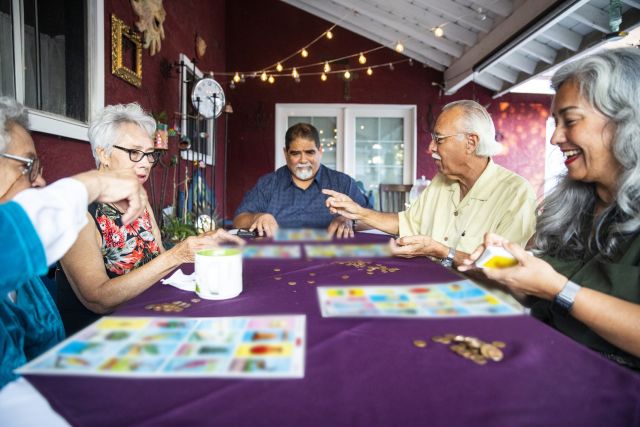Updated on January 7, 2025.
Sure, you could win a jackpot playing bingo, but the bigger prize may be what simply playing the game does for your health. Research suggests that leisure-time activities, including social pastimes and games, may help keep people healthier and feeling younger.
Active leisure time and your health
Many studies have looked at the health benefits of staying active in one’s free time. Research has established a clear link between doing brain-stimulating activities and a lowered risk of cognitive decline and dementia. But leisure-time activities of all sorts have a variety of benefits.
For example, in a Japanese study of about 50,000 older adults, researchers counted the number of leisure-time activities in which each person took part, from jogging to karaoke. Then, they tracked how many people developed new disabilities over a nearly six-year period. They found more activities a person did, the lower their chances of disability. The results were published in 2022 in Preventive Medicine Reports.
Just being around people who are socially active may also be good for you. A large study of people in Japan, published in 2022 in Journal of Urban Health, found that merely living in a socially active neighborhood was tied to a delay in the onset of health problems.
Playfulness and physical activity
Leisure time can be spent doing all sorts of enjoyable or healthy activities, but play is perhaps a special subset. And play—and playfulness as a quality—have been receiving more attention from researchers.
While play and playfulness are most often associated with children, adults can also be playful, though they might be more likely to be described as lighthearted, fun, or whimsical. Playful adults might be more motivated to seek fun, less inhibited, and more flexible and open to spontaneity.
When kids play, they’re often more physically active than when they’re not playing. What about adults? One 2018 study in Frontiers in Psychology set out to answer that question.
Researchers took note of the different facets of playfulness, which they defined as a personality trait that helps someone frame everyday situations as entertaining or interesting. They looked first at people’s self-ratings of playfulness, and ratings from people who knew them. Next, they looked at the person’s reported physical activity level and fitness.
They found that there was a correlation between someone being considered by themselves or others as “playful” and their level of overall activity, as well as their cardio-respiratory fitness.
Playful adults, like playful children, seem to indeed be more active—and an active lifestyle brings many health benefits.
Dementia and play
Researchers have begun looking at how active game play positively affects people with dementia. One small 2022 pilot study published in Clinical Gerontology, for example, examined how it influences older people with the condition.
Before and after eight weeks of playing Xbox 360 Kinect, participants were given special tests that measured quality of life, depression, and cognition. A separate group of participants acted as controls and didn’t play the Xbox. Researchers found that although the players’ cognition had not improved, their quality of life and depression definitely had.
Another study, published in 2022 in BMC Geriatrics, looked at a very different, more hands-on type of play, called Play Intervention for Dementia. It involved toys, musical instruments, painting implements, ball games, card games, pairing games, and storytelling games.
Rules were far and few between, and play assistants guided and helped participants to spontaneously play and express themselves. Qualitative researchers interviewed the assistants and caregivers about their experiences and observations, and found they reported a marked difference in energy levels, with participants being unusually excited, engaged, motivated, and demonstrably more capable than usual.
Play seemed to also be cathartic—a way for both the participants and their caregivers to let off steam. The caregivers reported feeling more attentive to the participants’ emotional state and feeling compassion and empathy for them.
Playfulness and quality of life (QoL)
There have been a number of studies that point to playfulness as a quality that contributes to various aspects of psychological and emotional well-being, including resilience and an improved ability to cope with stress. One 2021 study in particular, published in the Journal of Mental Health Counseling, looked at the broader view—the quality of life of people who were more playful.
The authors found that the more playful a person was, the higher their quality of life. They also looked at participants’ subjective age, or how old/young they felt inside, regardless of how biologically old they actually were. They found that the younger a person’s subjective age, the higher their level of playfulness.
So, perhaps merely thinking of ourselves as youthful will encourage us to approach life in a more playful manner and reap the benefits of that mindset.
Why it works
Researchers have a number of ideas for how playfulness and play promotes health. A playful mindset might help someone look at a situation from multiple points of view, rather than getting stuck in one mental place. Play can boost overall health by helping a person be more physically active, and it can provide a valuable mode of expression. Play and playfulness also both lend themselves to humor and socializing, and this can help ward off the blues and isolation.
If you’d like to incorporate more play in your life, here are some ideas:
- Explore a variety of new hobbies.
- Put together a collection of your favorite funny jokes and humorous movies and books, and enjoy them with others.
- Try out different creative and expressive arts.
The bottom line? A healthy lifestyle should includes things like a healthy diet, exercise, and adequate sleep. But if you want to up your game, be sure to pursue activities that you truly enjoy and that get you laughing, socializing, moving your body, and feeling like you’re a kid again.







